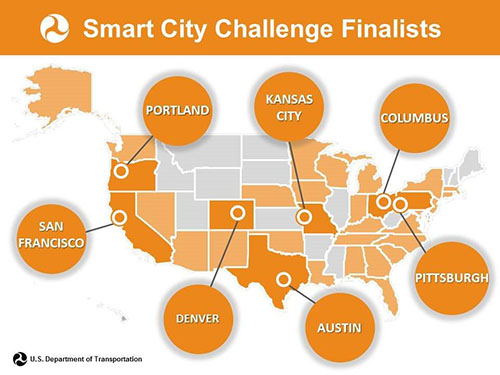Research is about more than just studying a problem in search of a solution. Sometimes, research is about realizing a vision.
Imagine, for instance, a city with a robust downtown, vibrant neighborhoods, and bustling suburbs. It’s a city of the future, in which people circulate freely, but not by routinely using their own cars. Oh, people still have cars; they just don’t think of them as their sole (or even primary) mobility option anymore. Instead, they consider options like on-demand mobility, self-driving vehicles, readily-available transit, biking, walking, and others, all made more practical thanks to lightning-fast technology advancements and innovative thinking.
 The city I describe here has evolved through multiple development strategies that enable people of all races, incomes and ages to move about freely in pursuit of strong schools, promising jobs, and abundant leisure activities. It’s a city where crippling traffic congestion that chokes economic activity is a part of history.
The city I describe here has evolved through multiple development strategies that enable people of all races, incomes and ages to move about freely in pursuit of strong schools, promising jobs, and abundant leisure activities. It’s a city where crippling traffic congestion that chokes economic activity is a part of history.
Austin, Texas is embracing a vision to be that city and to then spread that vision to other cities, in part to demonstrate how making transportation more accessible can create ladders of opportunity. The Texas A&M Transportation Institute (TTI) shares that same vision. And the city is a big step closer to realizing it, having just been named as a finalist in the U.S. Department of Transportation’s Smart City Challenge.
I believe Austin has what it takes to bring home the big prize – up to $50 million, which would be used to invest in groundbreaking technologies to improve mobility, safety, and environmental conditions, and create opportunities for underserved communities. As Mayor Steve Adler noted recently, “No other city is better positioned than Austin to realize the potential of the Smart City Initiative. Moreover, no U.S. city is in more need of innovation in transportation to address our most pressing challenges of mobility and affordability.”
The Mayor has assembled an amazing team to pursue the vision. It includes local and regional agencies, non-governmental organizations, private companies, technology incubators, and influential community leaders. It also includes research agencies that form a powerful new transportation “research triangle” for smart city transportation solutions. TTI is honored to be one of those research partners, along with Southwest Research Institute and the University of Texas Center for Transportation Research. We’re exceedingly proud to be an integral part of the team that’s made it this far in the national competition, and we feel really good about our chances to help Austin be a $50 million winner in June.
Our cities are growing, and our transportation problems are growing along with them. We can’t idly sit by and hope the problems go away, nor can we keep doing things the way we always have. We can’t meet tomorrow’s challenges with yesterday’s ideas.
What we can do, is be smarter. We can think bigger. We can completely transform the ways in which we move about.
We can turn vision into reality.
Ginger Goodin, P.E. is the Director of TTI’s Transportation Policy Research Center.